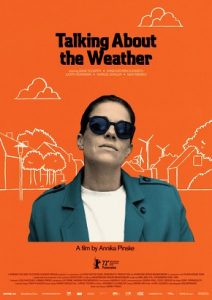
“Talking About the Weather” (“Alle reden übers Wetter”)
(Germany)
Screened at the Gene Siskel Film Center Chicago European Union Film Festival (3/5); Letterboxd (3/5), Imdb.com (6/10)
What truly makes us happy in life? Is it our ability to impress others with our accomplishments and an impressive body of knowledge? Or is it the simple things, like family, friendly conversation and spending time in the company of those we love? Those are the questions posed in writer-director Annika Pinske’s debut feature. The film tells the story of Clara, a middle-aged college lecturer and doctoral candidate (Anne Schäfer) living in Berlin, who seems confused and somewhat uncomfortable with her existence. That gets called into question when she pays a weekend visit to her hometown in rural eastern Germany, a community that was once part of Communist East Germany and has had trouble adjusting to Western economic and social ways. The contrasts between these two locales couldn’t be more extreme – an academic ivory tower in a cosmopolitan city and a folksy, economically challenged village where life is comparatively simple. The differences in atmosphere and attitudes are also palpable; Clara’s life in Berlin is filled with toxic psudointellectual toadies deeply engaged in mental masturbation and professional one-upsmanship, while the country folk – who are often looked down upon as homespun rubes – converse about things like the weather, the arrangement of items on platters of food and the people around them. The question for Clara then becomes, which of these options is more fulfilling? This sentiment may not be especially original, though it’s good for us as social beings to be reminded of it now and then, and that’s what this film seeks to achieve. Regrettably, it doesn’t pull off that accomplishment as well as it might have. The opening segment, before Clara embarks on her trip, goes on far too long and really runs the stilted intellectual discussions between her and her peers into the ground, making viewers wonder what exactly are they watching. It’s only when we see her out of her collegiate element that the purpose behind much of what preceded it becomes clear, and that subsequent segment, unfortunately, tends to get short shrift and is often presented in a fashion whose message and character are a little too obvious. Better balance in the writing, editing and directing would have helped immeasurably and made the film and its meaning more effective. But, then, for a first-time feature, I suppose it takes a new director some time to get these kinds of things sorted out a little better, and that’s apparent in the final product here. It represents a nice try for a filmmaker who appears to have some potential but who needs to get the kinks worked out of her material going forward.




Leave A Comment